Hotel Investments in Lebanon: Future is Bright for Budget Hotels
Discussion of real estate, tourism real estate in Lebanon, their partnership with InterContinental Hotels Group and potentials of Lebanon with the leader in the tourism real estate: SGHL. Mr. Salha sees an opportunity in the budget hotels though the Lebanese infrastructure is still not ready for mass tourism in Lebanon.
Interview with Mazen Salha, Chairman of SGHL (Societe Des Grands Hotels Du Liban) & Owner of Phoenicia and Vendôme Hotels
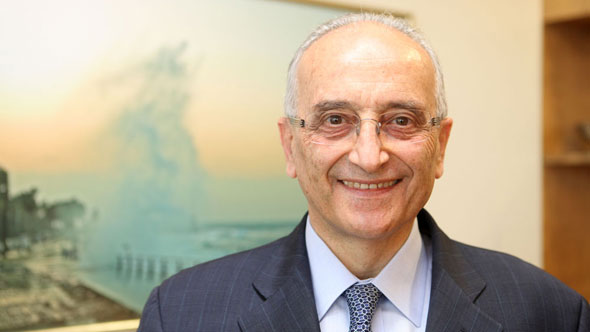
You are a pioneer in your field, and the Phoenicia speaks for itself – it is the icon, the hotel of Lebanon. Please tell us more about the Phoenicia.
The Phoenicia has already become a heritage institution. In the industry itself it is very significant for the country, perhaps because it carries the name Phoenicia, which refers to ancient history and so has great significance in that sense. To begin with, when the founders were first thinking of a name for the hotel in the 60’s, there was quite a lot of resistance to calling it Phoenicia.
This was the time of the pan-Arab movement in the Middle East, and referring to this property as the Phoenicia was in a way contrary to this political movement. However, the investors, and my father in particular, insisted on the name, saying that they were not doing anything of political reference, but something relating to the country’s heritage. We are all very pleased that it carries this name; it gives it a lot of weight and I think it has become an iconic part of the city and the country.
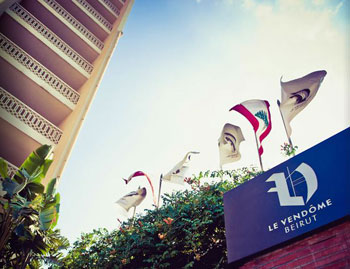
Looking at what is now happening in the region, we have seen that the Arab Spring has certainly been a major event over the past fifty years, Egypt is currently struggling with a new government and there is a possibility that the violence in Syria could spill over to the north of Lebanon, so with all this uncertainty, what do you feel is the outlook for Lebanese tourism and tourism real estate (a project in Lebanon)?
The confluence of the Arab Spring and the financial crisis, just two years apart from each other, did create a lot of anxiety and fear in Lebanon, but it turned out to be very positive because the Lebanese economy did very well in the financial crisis. The country was very well protected. As our Governor has said several times, the Central Bank of Lebanon has been very prudent in the way it managed the crisis, and the country has been very well protected both economically and financially. On the other hand, the political aspects of the Arab Spring have shown similarities in Lebanon, because having gone through a war of fifteen or twenty years, it’s as if we have already gone through what the Arab countries are going through now, so in a way we were also protected from a political point of view.
We still have a lot of political issues here to deal with, but it is as if we are one step ahead and almost isolated or protected. In that sense the Arab Spring has actually benefited Lebanon; we are one of the few countries in the area that did not have to go through it again. It has instead created a haven, and in the last two years people have come to Lebanon in bigger numbers. Last year was a little bit difficult because there was some uncertainty and a lot of people were taking their time to decide whether they would come to Lebanon or not. We had a drop in our business last year, both as a sector and an industry, but this year has picked up very well, we have also seen new markets emerging in the area. For example, a lot of the business last year was diverted to Turkey, and the Arab countries in particular showed quite a lot of interest in the Turkish market. However, we are seeing Lebanon taking up the slack again this year, the build up is very good, and we have had quite a significant increase in our business.
We feel very strongly about Lebanon. We feel our sector (tourism real estate) is one of the important sectors in the country and that there is a lot of scope here.
The regional events have transformed your investment strategy and those of other companies active in tourism development projects. How have the regional events impacted your operations and your investment plans? How are you playing the market at the moment?
This industry is a long-term investment. You don’t think of it in short, one-year terms, you always have to think at least two or three years ahead, and if you really want to keep ahead of the game, you have to be a little courageous and make courageous decisions. This is what we have been doing. We have continued with our development plans, we have continued with the necessary improvements to our properties, and we feel very happy to have done this, because this is an industry where you cannot fall behind. You must always keep ahead of the game.
But at the same time, I understand that you are currently in a rather contemplative, cautious state of mind? Is that right?
For any new developments, yes, but for anything to do with actual improvements of our existing properties, we do not take any chances and we do not take too long to make decisions about it. You just cannot leave a property like this to fall behind. You must always keep it in top shape, so we are continuously investing in the properties and doing all the improvements that we need to do.
As well as the two hotels, as a group you are also active in a different business line, namely restaurants, retail stores and consultancy. 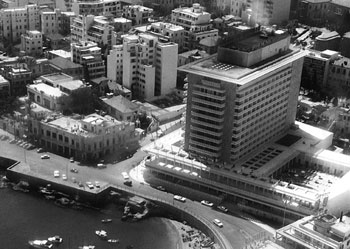 Which area do you see as the future generator of revenue? When you look at the General Electric metrics, which one will be the new star, and how do you manage the SGHL holding itself?
Which area do you see as the future generator of revenue? When you look at the General Electric metrics, which one will be the new star, and how do you manage the SGHL holding itself?
In a way, they all go hand-in-hand. The actual hotel itself and the hotel business is very important, but it is more long-term and more capital intensive. The consultancy business is a service, so it is shorter-term and less capital intensive. The two therefore complement each other and go hand-in-hand, and we deal with them on that basis.
We have touched a little bit on the future, and being an entrepreneur, you have a futuristic view of Lebanon. What are some of the iconic projects that you might be coming out with should the regional turmoil subside? What sort of developments are you dreaming about?
I think there is a lot of scope for budget hotels. We need to look at this because we do not see mass tourism in Lebanon yet, because the infrastructure for it does not exist. We feel there is a shortage here that has to be dealt with. We really have to think about developing the infrastructure for mass tourism if we want to go ahead with it.
Let’s briefly discuss tourism in Lebanon. It is true that Lebanon is doing very well in the summer months, during the high season, but tourism in Lebanon is rather seasonal. I know that the Ministry of Tourism is trying to promote 365 Days of Tourism. What is your take on this?
The seasonality has become much less than in the pre-war period. During the pre-war period it was much more defined: we had the summer season and we had a drop in our winter season. Now, with all the different events that are happening in the city such as business conferences and cultural events, the seasonality is becoming much less. We have seen that the average year-round occupancy for a normal year does not really go below 65%.
I would like to ask you about your relationship with InterContinental Hotels Group (IHG). You are the owners of the hotel and you have an agreement with InterContinental. How is this relationship working out? What are the advantages of partnering up with IGH?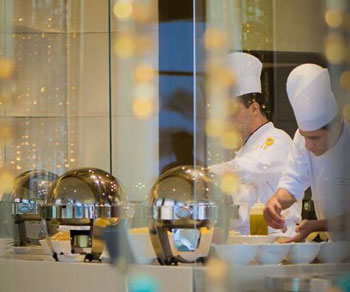
In any hotel that has a management agreement with an operator, the relationship is very close. It is really a partnership and both of them have to support each other. The operators deal with the day-to-day business while we as owners have to support all their needs. We have to continuously make sure that the product is up to standard, and that takes quite a lot of close cooperation between the two.
Regarding tourism real estate in Lebanon, what is the outlook for this sector? We have seen that real estate prices have consolidated from the heights of 2010. Would you say this is the right time to invest now, or what sort of message would you deliver on the real estate front?
This is quite an interesting issue here in Lebanon, for two reasons. The prices of real estate in Lebanon are a deterrent rather than anything else. You cannot say that they have really stabilized, although they may perhaps have stabilized for the moment. However, property or real estate is in such short supply that the price of land in particular has always been on the up. The prices have always gone up rather than down. I do not see the price of land going down, so you cannot say that if you wait a bit longer, you might be able to get land at a cheaper price. It has never happened; it is always a good time to go find land and buy it, even if you are not going to go ahead with the project right away, because any piece of land you buy today is going to be more expensive in another six months’ or a year’s time. It is in such short supply that good land is always going to be very expensive.
Are you particularly optimistic about any particular region in Lebanon where there is a lot of tourism potential? Any future Phoenicias?
As an owning company we are not particularly interested in resort projects unless they are really unique and have a niche aspect to them. We are more city investors. We feel that it is a safer long-term strategy.
So are you going to stay local, or do you have any international plans?
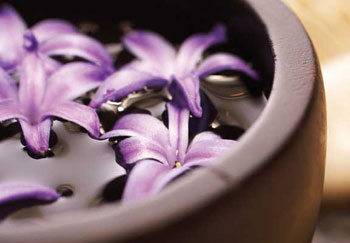
We do have intentions of going international, but they are still in the planning stages. We are still looking at different markets and we do not have anything really concrete that I can tell you about at the moment.
Of course there is a lot of competition, especially in the Gulf, where money is born in the ground and they have the advantage of a lot of liquidity and a lot of money, and they can do whatever they want. The Kuwait Investment Authority is buying out Mercedes, for example, so how can you compete on this level with the Gulf states in particular?
A lot of the Gulf states are going after important, iconic properties or names. Sometimes they pay a lot of money for these properties without considering the actual returns. They are more concerned with glamor and prestige investments, but if you really think about the time and the money involved in investments like that, it could be up to ten or fifteen years, and we are really not interested in going into such investments. We would typically like to see a return on our investments of between six and seven years. This is one of our prime considerations. Of course, this has unfortunately not always been the case here in Lebanon, because there has been quite a lot of upheaval in the market and things have taken a bit longer than planned. However, this is a different situation because we had pre-existing properties here and we really had to go ahead with redeveloping them, irrespective of the return.
I think we have covered all the important questions about real estate, tourism, investment strategy and so on. Is there anything you would like to add as a final message?
We feel very strongly about Lebanon. We feel our sector is one of the important sectors in the country and that there is a lot of scope here. As I said, the budget tourism business has not really happened here in Lebanon yet; it is still very much less than it should be compared to the deluxe tourism business. We feel there is potential in this and we are keen on taking part in it when we feel the time is right.